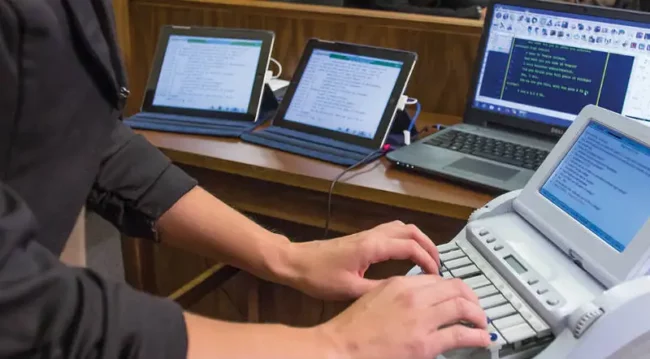Using a Real-Time Court Reporter in Texas: A Comprehensive Guide
 Real-time court reporting is an invaluable service in the Texas legal landscape, offering immediate access to spoken testimony during legal proceedings. This technology has transformed how attorneys and legal teams strategize and manage their cases, especially in high-stakes litigation. Understanding the benefits, process, and applications of real-time court reporting can significantly enhance legal efficiency and outcomes.
Real-time court reporting is an invaluable service in the Texas legal landscape, offering immediate access to spoken testimony during legal proceedings. This technology has transformed how attorneys and legal teams strategize and manage their cases, especially in high-stakes litigation. Understanding the benefits, process, and applications of real-time court reporting can significantly enhance legal efficiency and outcomes.
What is Real-Time Court Reporting?
Real-time court reporting involves a certified court reporter using advanced stenography machines and computer-aided transcription software to convert spoken words into text instantly. The transcript is then transmitted to computer screens or digital devices, allowing participants to view the testimony as it unfolds. This differs from traditional court reporting, where transcripts are produced after the proceeding and Hanna & Hanna Reporting is here to provide experienced real-time court reporters.
Benefits of Real-Time Court Reporting in Texas
Using a real-time court reporter in Texas provides numerous advantages:
- Immediate Access: One of the most significant benefits is the immediate availability of the transcript. Attorneys, judges, and other legal professionals can read the testimony as it is spoken, ensuring nothing is missed or misunderstood. This instant access allows for better comprehension and analysis of the proceedings.
- Enhanced Efficiency: With real-time reporting, legal teams can quickly review and highlight critical statements, contradictions, or inconsistencies. This immediacy streamlines the process of identifying key issues and formulating responses, saving valuable time and resources.
- Strategic Advantage: Real-time transcripts enable attorneys to adjust their questioning strategies in real-time. If a witness provides unexpected answers or shifts their narrative, attorneys can immediately adapt their approach, ensuring they stay on top of the testimony and effectively pursue their objectives.
- Improved Collaboration: Real-time reporting facilitates seamless collaboration among legal team members. Transcripts can be shared instantly across digital platforms, enabling multiple team members to follow along and contribute in real-time. This is especially useful in complex litigation where several attorneys and paralegals are involved.
- Accessibility: Real-time court reporting enhances accessibility for individuals with hearing impairments or those participating remotely. The immediate text display ensures that everyone can follow the proceedings, promoting inclusivity and fairness.
- Trial Preparation: Having a real-time transcript available during a trial allows attorneys to prepare their cross-examinations and closing arguments more effectively. They can quickly locate specific pieces of testimony, ensuring their arguments are supported by accurate and timely information.
Pros of Real-Time Court Reporting
Real-time court reporting offers immediate access to testimony, allowing lawyers and judges to review proceedings instantly. This enhances efficiency by enabling quick identification of key statements and inconsistencies. Attorneys can adapt questioning strategies in real-time, gaining a strategic advantage. Collaboration improves as transcripts are shared digitally, benefiting team communication. Accessibility is enhanced for those with hearing impairments, ensuring inclusivity. During trial preparation, instant transcripts aid in cross-examinations and arguments, saving valuable time and resources. Real-time reporting ensures a more accurate, informed, and efficient legal process.
Real-Time Court Reporting Processes in Texas
The process of using a real-time court reporter in Texas is straightforward but requires coordination and preparation:
- Scheduling: The first step is to schedule a certified real-time court reporter. This involves contacting a reputable court reporting agency that specializes in real-time services. When scheduling, provide details such as the date, time, location, duration, and specific needs of the legal proceeding.
- Preparation: Before the proceeding, it is helpful to provide the court reporter with relevant case materials, terminology lists, and any special instructions. This preparation ensures the reporter is familiar with the subject matter and can accurately transcribe specialized language or jargon.
- During the Proceeding: The real-time court reporter will arrive equipped with a stenography machine and a laptop connected to a network. As the proceeding unfolds, the reporter will use the stenography machine to capture the spoken words. The software then translates these stenographic notes into text, which is immediately transmitted to the connected devices.
- Real-Time Feed: Participants can view the real-time transcript on their laptops, tablets, or other digital devices. The text appears line by line as it is spoken, providing an ongoing record of the proceedings. Attorneys can highlight, annotate, and search the transcript in real time.
- Post-Proceeding Deliverables: In addition to the real-time feed, the court reporter will provide a certified transcript after the proceeding. This official transcript is a complete and accurate record of the entire event and can be used for appeals, case research, and other legal purposes.
Applications of Real-Time Court Reporting in Texas
Real-time court reporting is beneficial in various legal settings in Texas:
- Complex Litigation: In cases involving numerous parties, extensive evidence, and intricate legal arguments, real-time reporting is invaluable. It helps attorneys manage vast amounts of information and identify critical details quickly.
- High-Stakes Depositions: For crucial depositions where witness credibility and testimony accuracy are paramount, real-time reporting allows attorneys to assess witness statements and strategize effectively during the deposition itself.
- Trials: During trials, real-time reporting enables attorneys to access testimonies instantly, aiding in cross-examination and closing arguments. Judges also benefit from real-time transcripts for quick reference and decision-making.
- Arbitration and Mediation: Real-time transcripts can enhance arbitration and mediation by providing immediate access to spoken agreements and discussions. This ensures clarity and accuracy in documenting the proceedings.
- Hearings: Administrative hearings, court hearings, and other similar proceedings can benefit from real-time reporting, especially when detailed records and immediate access to information are crucial.
Choosing a Real-Time Court Reporter in Texas
Selecting a qualified real-time court reporter is essential for ensuring accuracy and reliability. Consider the following factors:
- Certification: Ensure the court reporter is certified by the Texas Judicial Branch Certification Commission (JBCC) and holds relevant certifications from national associations like the National Court Reporters Association (NCRA).
- Experience: Look for reporters with experience in real-time reporting, particularly in the specific area of law relevant to your case. Experience ensures the reporter is familiar with legal terminology and procedures.
- Technology: Confirm the reporter uses advanced technology and reliable software for real-time transcription. The technology should ensure a seamless and uninterrupted feed during the proceeding.
- Availability: Ensure the reporter is available on the required dates and times and can accommodate any specific requests or needs.
- References: Check for client testimonials and references to gauge the reporter’s professionalism, accuracy, and reliability.
Schedule with the Best Court Reporting Company
Real-time court reporting has become an indispensable tool in the Texas legal system. Its ability to provide immediate access to spoken testimony, enhance efficiency, and support strategic decision-making makes it invaluable in various legal proceedings. By understanding the benefits, process, and applications of real-time court reporting, attorneys and legal professionals can leverage this technology to their advantage, ensuring accuracy, clarity, and success in their cases. Selecting a certified and experienced real-time court reporter is essential for maximizing these benefits and ensuring a seamless and efficient legal process. In the fast-paced and demanding world of law, real-time court reporting offers a critical edge, helping legal teams stay ahead and achieve the best possible outcomes for their clients.
